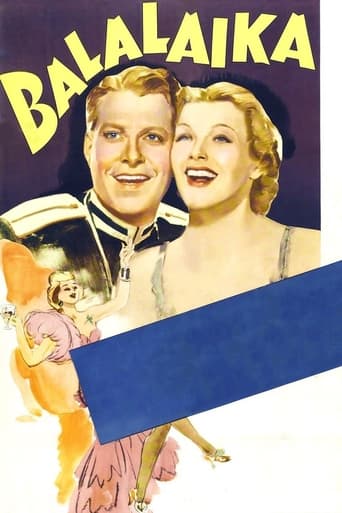TheLittleSongbird
Balalaika is not the worst of Nelson Eddy's films, that's I Married an Angel and even that for this viewer was not that bad. But it's not even close to the likes of Maytime, New Moon and The Chocolate Soldier. Balalaika is a decent and quite nice film but did come across as very problematic. Eddy has never been the best of actors(his best performances have been in Chocolate Soldier, Maytime and Let Freedom Ring), and Balalaika doesn't really change that perception. He is at least better than he was in The Phantom of the Opera and I Married An Angel and at least he is more convincing as a Russian than he was as an Austrian in Bittersweet. But he is very stiff and wooden here, he has charming moments but he never looks comfortable. The story is also very predictable, cumbersome and even silly(at times), and the pacing can be rather dull. The script fares little better, often awkward sounding and lifeless- the film was strongly censored at the risk of offending so that could be why- while the humour is mild and unfortunately not very funny. Charles Ruggles fares the best in the supporting cast, but excepting the last fifteen minutes where he's affecting Frank Morgan's comic talents are not really put to good use and his performance is somewhat indifferent. The costumes and sets are beautiful, and the crisp black and white photography is especially striking in the Ride Cossack Ride and Stille Nacht (Silent Night) sequences, ones that is stirring for the former and poignant for the latter. The score and songs are a treat to listen to, At the Balalika, Ride Cossack Ride, Song of the Volga Boatmen and Toreador Song are particularly great. Frank Morgan's song in the last fifteen minutes is also very moving, as is the ending itself. Even if his acting is not up to snuff, Eddy still produces some magnificent singing in Balalaika(the best thing about the film), always robust and beautiful and at its best in Ride Cossack Ride and Song of the Volga Boatmen. And extra credit for singing in four languages in one film, you don't hear that very often. Ilona Massey looks absolutely stunning- even that doesn't do justice to her beauty actually- and a worthy leading lady for Eddy. They work well together and blend nicely(if not quite as much as Eddy and Jeanette MacDonald). In conclusion, a nice decent film but a long way from one of Nelson Eddy's finest hours. 6/10 Bethany Cox
atlasmb
I found this film enjoyable for a number of reasons. First, the black and white cinematography, which contributes to the moods of the scenes. A romanticized version of Soviet Russia is presented and the lighting, scenery and music all play their parts in this portrayal.The film was released in 1939 (the golden year of cinema) and at that time, the U.S. was debating its role in the world conflict that was developing. There was a general ignorance of the Stalin atrocities and an ambivalence about Russia as ally or enemy. Portraying Russia as a victim of WWI was not unrealistic and contributed to the sympathetic depiction of the nation and its peoples.As other writers have written, Nelson Eddy acts rather stiffly. But I found his singing very enjoyable. The object of his affections, played by Ilona Massey, is rather charming and talented. THe other players were amusing and talented. The Wizard of Oz was released the same year. If anyone happened to see Balalaika and TWOZ back to back, they must have done a double take when they saw Frank Morgan in his mustache and his busby playing nearly identical roles. In Balalaika, the applicable scene is near the end of the film. In TWOZ, he played the guard to the city of Oz (among other roles). In a few (long) years--after WWII--America's view of Soviet Russia would change dramatically. Here is a view of Russia before the American public came to see Russians as enemies.
bkoganbing
This movie asks the question, can a Cossack boy and a Bolshevik girl find true happiness either in old mother Russia or the new Soviet Union?In this movie the answer is no. Nelson Eddy and Ilona Massey are attracted to each other, but background and politics strive to keep them apart.While he was at MGM, Nelson Eddy and Jeanette MacDonald did very few films with other leads and in this one Nelson gets to act with the women who he did the second amount of co-starring with. Ilona Massey cuts a fine figure as a revolutionary with her father, Lionel Atwill who is a music teacher by day and a Bolshevik by night.Nelson Eddy apparently liked Russian themes. He did two other films with Russian elements in them, The Chocolate Soldier and Northwest Passage. His singing in Russian of The Volga Boatman is the high point of Balalaika.My favorite performer in this however is Charlie Ruggles. He plays Nelson Eddy's orderly and he plays the fool quite well. He steers clear of politics, but ultimately winds up the only real winner in this movie.Not the best or the worst of Nelson Eddy's screen efforts, but enjoyable.
kinder-1
Nelson Eddy and Ilona Massey Make a handsome couple in a gorgeous setting. Ilona portrays an anarchist in pre WW1 Russia who falls in love with a Russian prince, played with strength and humor by Nelson Eddy. Their duets are pleasing, and Nelson sings magnificently in Russian, German, French and English. The black and white photography captures the period and costumes well, and the two stars are so strikingly similar in looks, they could easily be siblings. Nelson demonstrates once again, what a loss he was to opera, but how fortunate to have him on film and hear that magnificent baritone.



